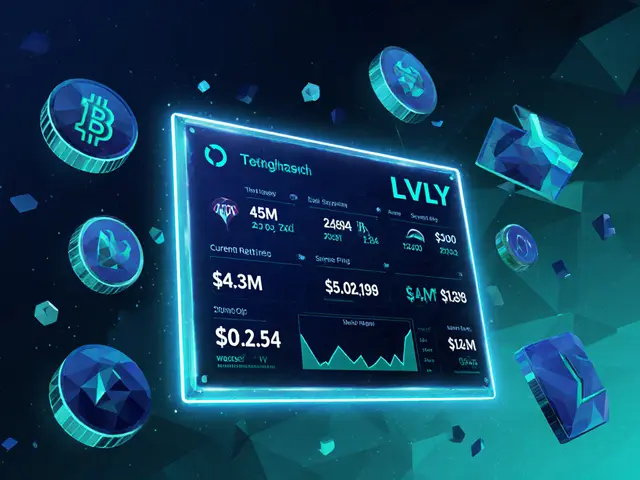Real-Time Crypto Alerts: Your Edge in DeFi, Airdrops & Stock Markets
When you rely on real-time crypto alerts, instant notifications about price spikes, new token drops, and portfolio risk signals. Also known as crypto alert system, it lets you act before the market shifts.
Pair that with DeFi lending alerts, updates on lending rates, collateral changes, and liquidations. These alerts encompass the best yield opportunities and protect you from sudden drops. Add crypto airdrop notifications, info on free token drops, eligibility criteria, and claim steps. Together they require a smart notification setup that filters noise and highlights real value. Finally, stock market alerts, real‑time signals on equities, indices, and sector moves link traditional finance to your crypto portfolio, showing how cross‑market trends influence crypto sentiment.
Below you’ll find a curated list of articles that dive deep into each of these areas – from hash‑rate basics to yield‑trackers, from airdrop guides to DeFi lending strategies. Explore the collection to sharpen your edge and stay ahead of every market pulse.

KriptoArena Exchange Review: Is This Crypto Platform Safe to Use?
KriptoArena Exchange shows no signs of legitimacy - no audits, no team, no user reviews, and no regulatory compliance. Avoid this untracked platform and choose verified exchanges instead.
Read More
Future of Metaverse Technology: How Blockchain Is Shaping the Next Digital Frontier
The future of metaverse technology is being shaped by blockchain, enabling real digital ownership, interoperability, and new economic models. Discover how NFTs, Web3, and AI are turning virtual spaces into legitimate business platforms.
Read More
Are Crypto Payments Allowed in Nigeria? The 2026 Legal Reality
As of 2026, crypto payments are legal in Nigeria under strict SEC regulations. Licensed exchanges can operate, banks can support them, and taxes apply to profits. Here's what you need to know to stay compliant.
Read More
Cryptocurrency Tax in Thailand: What You Really Need to Know About the 15% Myth
Thailand offers a 5-year crypto gains tax exemption until 2029 - but only on licensed exchanges. The 15% tax you heard about applies to foreigners, not locals. Know the rules before you trade.
Read More
AXL INU New Year's Eve Airdrop: The Scam Behind the Hype
The AXL INU New Year's Eve airdrop was a phishing scam targeting crypto users with fake token claims. Learn how it worked, how to protect your wallet, and why low-cap meme coins like AXL INU are dangerous.
Read More
EtherDelta and ForkDelta Crypto Exchange Review: History, Risks, and Why It Still Matters
EtherDelta and ForkDelta were pioneers in decentralized crypto trading. This review covers their history, security risks, slow performance, and why they still matter for niche traders today.
Read More
Understanding Transparency in Blockchain Networks
Blockchain transparency means all transactions are public, verifiable, and unchangeable. It builds trust without middlemen, powers smart contracts, and is transforming supply chains, governance, and finance.
Read More
Unifi Protocol DAO Explained: Not a Crypto Exchange, But a Cross-Chain DeFi Ecosystem
Unifi Protocol DAO isn't a crypto exchange - it's a DeFi ecosystem with a cross-chain DEX called uTrade. UNFI is a governance token with low liquidity and uncertain future. Here's what you really need to know.
Read More
How DePIN Projects Work: Decentralized Infrastructure Powered by Blockchain
DePIN projects use blockchain to turn everyday hardware into income-generating infrastructure. Learn how tokenized rewards for sharing bandwidth, storage, and energy are building a decentralized future.
Read More
HTX (Formerly Huobi) Crypto Exchange Review: Features, Fees, and Real User Experience in 2026
HTX (formerly Huobi) is a top crypto exchange with zero-fee futures, a unique token buyback program, and strong growth in Asia and Africa. Learn its pros, cons, and real user experience in 2026.
Read More
Rhea Finance Crypto Exchange Review: Is This NEAR Protocol DEX Worth Your Time?
Rhea Finance is a consolidated DeFi exchange on NEAR Protocol offering streamlined trading and liquidity. With 106 trading pairs and RHEA token volatility, it's ideal for NEAR users-but not for broad crypto traders.
Read More
FLY Airdrop by Franklin: How to Get Free FLY Tokens and What You Need to Know
Learn the truth about the Franklin (FLY) airdrop-past campaigns, current status, where to trade, and whether it's worth your time in 2026. No hype, just facts.
Read More




